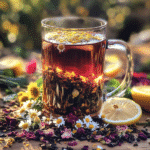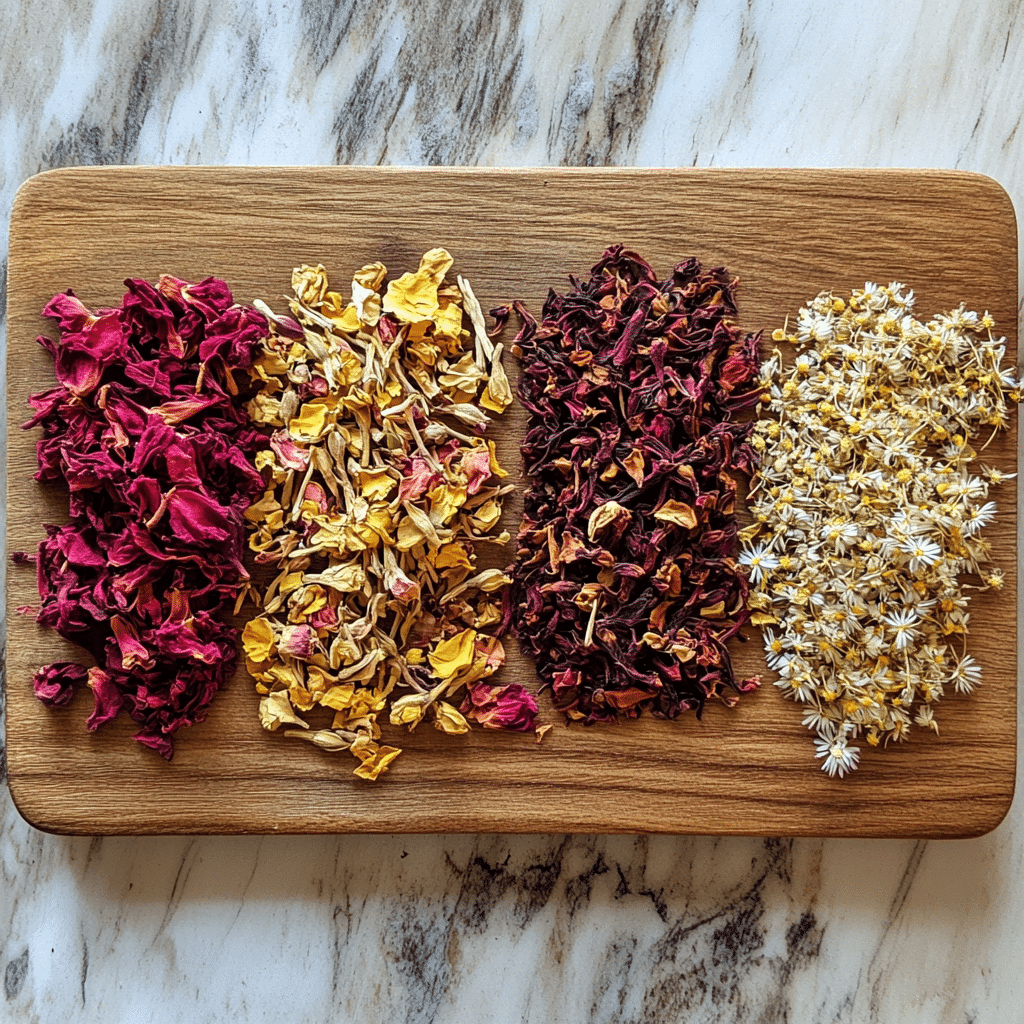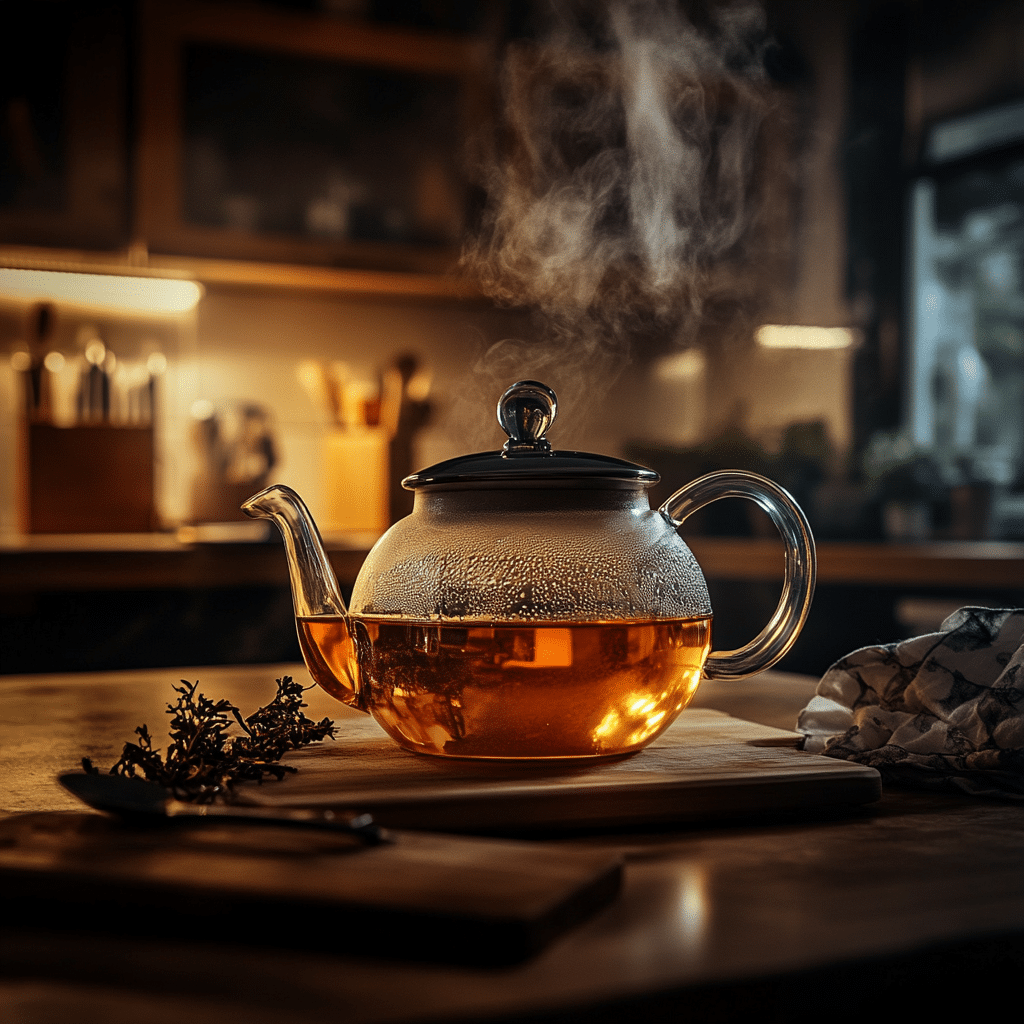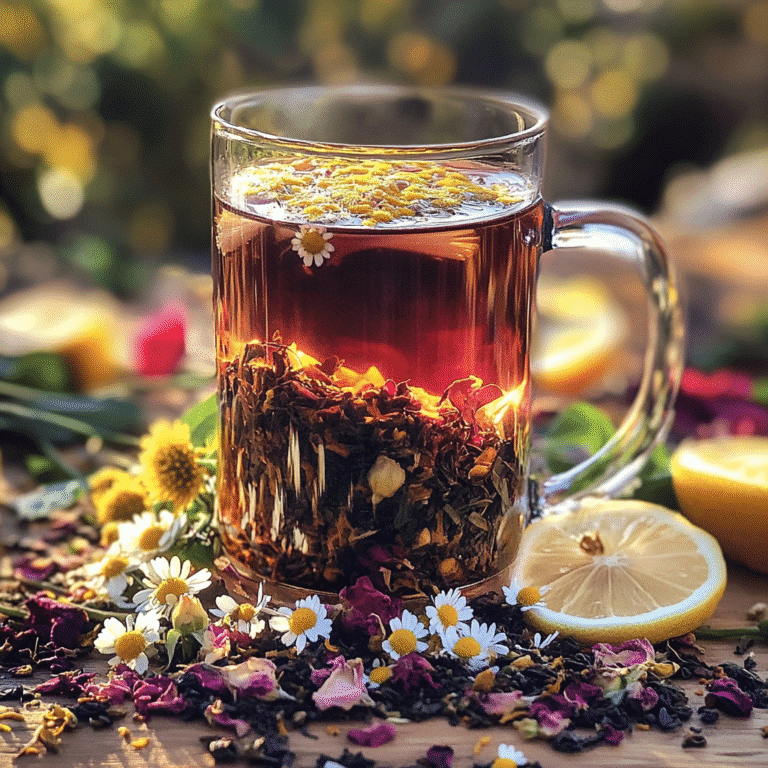Glow tea is more than just a pretty name — it’s a daily ritual rooted in natural wellness, designed to help your skin shine, your digestion flow, and your body feel its best. If you’ve been searching for a simple, natural way to support your beauty from within, this soothing blend of herbs is worth a try. At Recipe by Clara, where wholesome and functional recipes are our thing, I’ve embraced this tea not just for what it does — but for how it makes me feel.
In this guide, you’ll learn what this tea is really made of, how it enhances skin health and supports weight loss, and why it’s become a daily staple for beauty seekers and wellness lovers alike. We’ll explore its ingredients, side effects, and the best DIY brewing methods. I’ll also answer the most common questions people ask about this trending inner glow infusion.
Discover great ideas like Trader Joe’s Lobster Pasta to make your next mealtime as nourishing as your tea break.
Table of Contents
What Is Glow Tea and Why It’s Trending
The origin and evolution of glow tea
This herbal beauty Glow tea might be gaining traction on social media today, but it’s based on practices that date back centuries. Cultures using Traditional Chinese Medicine and Ayurveda have long relied on calming, skin-friendly herbs like hibiscus, rose, and chamomile. These were often brewed into calming infusions aimed at improving skin clarity, digestion, and overall vitality.
Modern versions of this detox tea for skin combine these herbs in purpose-driven blends marketed for internal and external health. Consumers love them for their clean ingredients, gentle effect, and alignment with today’s holistic wellness trends.
The popularity of clean skincare and natural remedies has turned this herbal trend into a staple in beauty routines everywhere.
What makes it different from regular tea blends
Unlike traditional green or black teas focused on energy or flavor, this skin-boosting blend is formulated with function in mind. Its main goals? Support your glow, aid digestion, reduce inflammation, and hydrate from the inside out.
| Feature | Standard Tea | Glow-Enhancing Blend |
|---|---|---|
| Focus | Caffeine, hydration | Radiance, detox, digestion |
| Ingredients | Black tea, green tea | Rooibos, rosehip, dandelion root, ginger |
| Benefits | Antioxidants, energy | Skin clarity, anti-inflammatory, gut health |
The difference lies in purpose. While most teas energize, this blend nourishes — from deep within.
Looking for inspiration? Try Banana Coffee Syrup to add a creative boost to your morning wellness routine.
Print
Glow Tea – The Ultimate Guide to Radiant Skin, Wellness & Weight Loss
- Total Time: 15 minutes
- Yield: 2 servings
Description
Glow tea is a calming herbal infusion designed to support radiant skin, digestion, and overall wellness — a ritual for beauty seekers and health lovers.
Ingredients
- 1 tsp dried hibiscus petals
- 1 tsp dried rosehip
- ½ tsp dried chamomile
- ½ tsp dried lemon balm
- 1 slice of fresh ginger (optional)
- 2 cups hot water
Instructions
- Combine all ingredients in a teapot or large mug.
- Pour hot water over the herbs.
- Cover and steep for 7–10 minutes.
- Strain the tea into a cup.
- Enjoy warm or chill for an iced version.
Notes
Use filtered water for best taste and steep covered to preserve essential oils. Drink 1–2 cups daily to support inner glow and skin health.
- Prep Time: 5 minutes
- Cook Time: 10 minutes
- Category: Beverage
- Method: Infusion
- Cuisine: Wellness
Key Ingredients in Glow Tea and Their Benefits
Herbal Powerhouse: Chamomile, Hibiscus, Green Tea & More
What makes glow tea truly special isn’t just its purpose — it’s the ingredients. Each blend varies slightly, but the foundation usually includes a combination of herbs known for their skin-loving, detoxifying, and calming properties. Let’s break down the most popular herbs you’ll find in these radiant skin teas and why they matter:

- Chamomile
Known for its soothing properties, chamomile is a gentle anti-inflammatory that helps reduce skin irritation and support gut health. It also promotes restful sleep, which is essential for natural skin repair. - Hibiscus
Rich in antioxidants like anthocyanins and vitamin C, hibiscus can help protect the skin from free radicals, support collagen production, and enhance circulation — leading to a brighter complexion. - Green Tea
Packed with EGCG (epigallocatechin gallate), green tea helps fight acne, reduce inflammation, and boost metabolism. It’s often included in glow tea blends for its weight management support and antioxidant power. - Dandelion Root
A natural liver cleanser, dandelion root aids detoxification and digestion. It’s known for flushing out excess water and toxins, which can visibly improve skin clarity. - Rooibos
A caffeine-free tea from South Africa, rooibos is rich in zinc and alpha hydroxy acid. These elements support skin renewal and reduce signs of aging. - Ginger
Beyond its warming flavor, ginger promotes circulation, improves digestion, and contains antimicrobial properties that can contribute to clearer skin. - Rose Petals or Rosehip
Rose components add a floral aroma but also carry vitamin C and anti-inflammatory properties that help soothe sensitive skin and boost radiance.
Don’t miss our Mexican Elote Recipe if you’re looking for a glow-up from your kitchen as well.
Antioxidants and Their Impact on Skin and Digestion
Glow teas are often praised for their antioxidant content — and for good reason. Antioxidants help reduce oxidative stress, which is a major contributor to dull, aging skin and poor digestion. They neutralize free radicals in the body, helping to protect cells and promote healthy turnover.
Here’s how these antioxidants support your glow:
| Antioxidant Source | Benefit |
|---|---|
| Green tea (EGCG) | Reduces inflammation, regulates sebum production |
| Hibiscus (Vitamin C) | Boosts collagen, brightens skin |
| Rooibos (Flavonoids) | Fights wrinkles, soothes irritation |
| Rosehip (Polyphenols) | Enhances skin elasticity, reduces redness |
But it’s not just about your skin. These same compounds aid digestion by reducing inflammation in the gut lining, promoting better absorption of nutrients, and balancing your microbiome — which scientists now link directly to skin health.
That’s why glow tea isn’t just skin-deep — it supports wellness from your digestive tract to your dermis.
Check out Scrambled Cookie for a treat that pairs well with your next cup of inner glow infusion.
How Glow Tea Enhances Your Skin’s Natural Glow
Tea for Skin Health: Does It Really Work?
We all love the idea of glowing skin, but does sipping glow tea actually make a difference? The short answer: yes — with consistency and the right ingredients. Glow tea supports skin health through internal hydration, reduced inflammation, and nutrient delivery.
Here’s how this works:
- Hydration
Glow teas keep you hydrated without caffeine spikes, which can dehydrate the skin. Hydration supports cell regeneration and maintains skin elasticity — a must for that fresh, dewy look. - Inflammation Reduction
Ingredients like chamomile, rooibos, and ginger have powerful anti-inflammatory effects. Since inflammation is a root cause of skin conditions like acne, rosacea, and dullness, reducing it naturally improves clarity and tone. - Hormonal Balance
Some herbs in glow tea, such as spearmint and dandelion, help regulate hormones, which is especially beneficial for those experiencing hormonal acne. - Improved Gut Health
A healthy gut directly impacts your skin. Glow teas with detoxifying herbs aid digestion and nutrient absorption, helping eliminate toxins that often show up on your skin.
When you drink glow tea regularly — ideally 1 to 2 cups daily — you’re feeding your body nutrients that support natural radiance from the inside out.
Check out Tacos Rojos Potosinos to complete your glowing-day menu with a spicy, satisfying dish.
Scientific Studies on Tea and Skin Improvement
Let’s look at the research. Multiple studies back up the skin-supporting properties of key ingredients found in glow tea:
| Study | Ingredient Studied | Findings |
|---|---|---|
| Journal of Dermatological Science (2016) | Green Tea (EGCG) | Reduced sebum production and acne |
| Nutrition Reviews (2014) | Hibiscus Extract | High antioxidant content linked to improved skin elasticity |
| Phytotherapy Research (2011) | Chamomile | Demonstrated anti-inflammatory and anti-bacterial properties for skin healing |
| International Journal of Molecular Sciences (2020) | Rosehip Extract | Shown to improve skin moisture and reduce wrinkle depth |
These aren’t just wellness buzzwords — the impact of these ingredients is supported by science. When brewed together, the synergy of these herbs creates a functional drink that supports both health and beauty.
Don’t miss our Chickpea and Spinach Curry for a skin-nourishing meal packed with protein and greens.
The Best Glow Tea for Weight Loss
Which Type of Glow Tea Supports Fat Burning?
While glow tea is often praised for its skin-enhancing qualities, many blends also contribute to healthy weight loss. Thanks to their combination of metabolism-boosting herbs, gentle detox agents, and digestive support ingredients, these teas can complement your weight loss goals without harsh cleanses or stimulants.
Here are some of the top-performing ingredients in glow teas that encourage fat burning:
- Green Tea
Rich in catechins like EGCG, green tea boosts fat oxidation and thermogenesis — the process your body uses to burn calories. It’s also one of the most researched natural weight loss aids. - Oolong Tea
A partially fermented tea that improves fat breakdown and helps regulate energy levels. Oolong supports digestion and may also suppress fat absorption. - Dandelion Root
Acts as a natural diuretic, helping to reduce water retention and bloating. It also stimulates bile production, which aids digestion and fat metabolism. - Ginger
Known to curb appetite and rev up metabolism, ginger is often added to detox blends for its ability to help burn more calories post-meal. - Lemon Peel or Lemongrass
Refreshing and supportive of the liver, these ingredients help the body eliminate toxins while improving digestive performance.
If you’re choosing a glow tea for weight loss, look for blends that combine thermogenic herbs like green or oolong tea with digestive aids like ginger, mint, or fennel.
Don’t miss our Mexican Elote Recipe for a flavorful, satisfying side that balances your clean eating goals.
Green Tea vs Oolong vs Detox Blends: What’s Most Effective?
Let’s compare these glow tea options side-by-side for weight loss support:
| Type of Tea | Main Benefits | Ideal For |
|---|---|---|
| Green Tea | Boosts metabolism, burns fat, rich in antioxidants | Everyday use, gentle fat-burning |
| Oolong Tea | Combines green and black tea benefits, supports fat breakdown | Mid-day energy and appetite control |
| Detox Glow Blend | Includes dandelion, ginger, and hibiscus for digestion and cleansing | Bloating relief, mild detox, post-meal support |
If you’re just starting out, green tea-based blends are a safe and effective way to ease into a fat-burning glow tea routine. For more intense digestion support or premenstrual bloating, detox blends with ginger and dandelion may be more suitable.
Check out Scrambled Cookie for a mindful sweet treat that won’t undo your wellness efforts.
How to Make Glow Tea at Home: Recipes & Tips
Easy DIY Glow Tea Recipes with Natural Ingredients
Making your own glow tea at home is simple, affordable, and fully customizable. Whether you’re aiming for brighter skin, better digestion, or gentle detox support, you can build the perfect herbal blend using ingredients that may already be in your kitchen or local store.
Here are a few tried-and-true recipes that balance taste and function:
Radiant Skin Glow Tea
Ingredients
- 1 tsp dried hibiscus petals
- 1 tsp dried rosehip
- ½ tsp dried chamomile
- ½ tsp dried lemon balm
- 1 slice of fresh ginger (optional)
- 2 cups hot water
Instructions
- Combine all ingredients in a teapot or large mug.
- Pour hot water over the herbs and steep for 7–10 minutes.
- Strain and enjoy warm, or chill for an iced version.
This blend is high in antioxidants and vitamin C, supporting collagen production and calming inflammation.

Detox and Skin Clarity Tea
Ingredients
- 1 tsp dried dandelion root
- 1 tsp green tea leaves
- ½ tsp fennel seeds
- ½ tsp mint leaves
- Juice from half a lemon (added post-steep)
Instructions
- Steep dry ingredients in hot water for 5–8 minutes.
- Add lemon juice after straining.
- Drink warm, preferably in the morning for best detox effect.
This blend gently stimulates digestion and liver detox pathways, ideal for clearing skin from within.
Brewing Techniques That Maximize Nutrients
To get the most from your glow tea, follow these tips:
- Use filtered water for clean extraction and better taste.
- Avoid boiling water for delicate herbs like green tea or rose petals; use water around 170°F–185°F to avoid nutrient loss.
- Steep covered to trap essential oils and maintain potency.
- Don’t over-steep. Most blends need only 5–10 minutes for full effect; steeping longer can bring bitterness, especially in green tea-based recipes.
Here’s a quick reference:
| Tea Type | Ideal Temp | Steep Time |
|---|---|---|
| Green Tea | 175°F | 3–5 minutes |
| Herbal Tea (chamomile, hibiscus) | 200°F | 7–10 minutes |
| Roots (ginger, dandelion) | 212°F (boiling) | 10–15 minutes |
Fertility Teas vs Glow Teas: What’s the Difference?
Do Fertility Teas Actually Work?
Fertility teas are gaining popularity among people looking to support reproductive health naturally — but how effective are they really?
These teas typically blend herbs known to promote hormone balance, regulate menstrual cycles, and tone the uterus. Common ingredients include:
- Red raspberry leaf: Tones uterine muscles and supports cycle health
- Vitex (chasteberry): Helps regulate progesterone and balance hormones
- Nettle: Packed with minerals like iron, calcium, and magnesium
- Maca root: May boost libido and hormonal function
While many women report positive effects — such as more regular cycles, less PMS, or improved ovulation — scientific studies are still limited. Most evidence is anecdotal or based on traditional herbal use, not rigorous clinical research.
That said, fertility teas can be a helpful complement to a healthy lifestyle, especially when paired with stress reduction, balanced nutrition, and medical guidance.
Don’t miss our Tacos Rojos Potosinos for a hearty, hormone-friendly meal loaded with iron-rich ingredients.
Ingredients Comparison and Health Impact Differences
While glow tea and fertility tea might share some overlapping ingredients (like mint, nettle, or ginger), their primary goals and herb combinations differ significantly.
Here’s a side-by-side breakdown to help you see the difference clearly:
| Feature | Glow Tea | Fertility Tea |
|---|---|---|
| Main Focus | Skin radiance, digestion, detox | Hormonal balance, reproductive health |
| Common Herbs | Hibiscus, rosehip, chamomile, dandelion, green tea | Raspberry leaf, vitex, nettle, maca root |
| Target Audience | Wellness, beauty, skin health seekers | Women trying to conceive or balance cycles |
| Timing | Any time, especially mornings or evenings | Often recommended during follicular phase (first half of cycle) |
Glow tea is more general wellness-focused, benefiting the skin, gut, and liver, while fertility teas are reproductive system-specific, supporting hormonal rhythms and fertility readiness.
That’s why they shouldn’t be used interchangeably. If your goal is to enhance your skin or gently detox your system, glow tea is the way to go. If you’re focused on cycle health or conception, a specialized fertility tea may be more appropriate.
When and How to Drink Glow Tea for Best Results
Morning vs Night: Best Time for Benefits
Timing matters when it comes to getting the most from your glow tea routine. While there’s no one-size-fits-all answer, understanding how different blends affect your body can help you choose the best time of day to sip.
Morning Ritual
Starting your day with glow tea can:
- Hydrate your body after a night’s rest
- Stimulate digestion and metabolism
- Deliver a calm, focused energy (especially if it contains green tea or oolong)
A morning cup is ideal if your glow tea contains energizing herbs like green tea, ginger, or lemongrass.
Evening Wind-Down
Glow teas with calming herbs like chamomile, rose, or lemon balm are perfect for bedtime. They help:
- Soothe your nervous system
- Promote restful sleep
- Support overnight skin repair and detox
Evening glow tea is especially helpful if stress or poor sleep is affecting your skin health.
Want to enjoy it anytime? Choose a caffeine-free blend, and you’re safe to sip day or night.
Daily Dosage and Tea-Drinking Routines
Consistency is key. To see real skin and wellness benefits, make glow tea part of your daily self-care ritual.
How Much to Drink?
Most herbalists recommend:
- 1 to 2 cups per day for noticeable results
- Use 1 tsp of dried herbs per 8 oz of water
- Steep thoroughly (7–10 minutes) and drink while warm for better absorption
Drinking more than 3 cups a day isn’t usually necessary unless recommended by a wellness practitioner. Too much of even the gentlest herbs can sometimes lead to side effects like bloating or over-detoxing.
Best Practices for a Glow Tea Habit
- Drink on an empty stomach in the morning to stimulate digestion
- Pair with a light, nutrient-dense meal or snack
- Rotate blends every few weeks to keep things interesting and effective
- Consider tracking your skin’s progress in a journal or with photos
By sticking to a mindful routine, you’ll not only see improvements in your skin — but also feel more balanced, clear, and energized from within.
Side Effects and Considerations Before Drinking Glow Tea
Who Should Avoid Glow Tea?
While glow tea is generally safe for most people, it’s not one-size-fits-all. Like any herbal blend, certain ingredients may interact with your unique health conditions or medications. Before making it a regular part of your routine, take a moment to check if any of the following apply to you.
You should consult a healthcare provider before drinking glow tea if you:
- Are pregnant or breastfeeding (some herbs like hibiscus or dandelion can stimulate uterine activity)
- Take blood thinners or diuretics (green tea and dandelion may interfere)
- Have kidney or liver conditions
- Suffer from allergies to common herbs like chamomile or mint
- Have an autoimmune condition (certain detox herbs may overstimulate the immune system)
Even natural ingredients can cause unintended effects if consumed in excess or combined with medications. So if you’re unsure, start slow and track how your body responds.
Interactions With Medication or Conditions
Here are a few known interactions to be aware of:
| Herb | Potential Interaction | Caution For |
|---|---|---|
| Green Tea | Blood thinners (warfarin), stimulants | Heart conditions, anxiety |
| Dandelion Root | Diuretics, lithium, antibiotics | Kidney or gallbladder issues |
| Hibiscus | Lowers blood pressure | Hypotension, pregnancy |
| Chamomile | Sedatives, blood thinners | Allergy-prone individuals |
Also, while glow teas are marketed for detox, “over-detoxing” can occur if you consume too much too fast. This may result in symptoms like nausea, diarrhea, or fatigue as your body adjusts. If that happens, simply reduce the frequency or choose a milder blend.
Where to Buy Quality Glow Tea Online or In-Store
Trusted Brands and Organic Sources
If you’re ready to add glow tea to your wellness ritual but don’t want to make it yourself, you’re in luck. There are dozens of high-quality brands offering glow blends, but not all are created equal. The best glow teas are made with organic herbs, no artificial flavors, and clear sourcing information.
Here are a few reputable options:
- Traditional Medicinals: Their herbal blends like “Healthy Skin” and “Detox” are USDA organic and widely available.
- Pukka Herbs: Known for clean, sustainable sourcing and blends like “Radiance” with turmeric, aloe vera, and green tea.
- Yogi Tea: Offers affordable, skin-focused options like “Skin Detox” and “Soothing Rose Hibiscus.”
- Teami Blends: Marketed for skin clarity and digestion, often featured in beauty and wellness circles.
These brands have built trust with customers by using transparent labeling and third-party testing. If you’re shopping in person, you’ll often find these glow blends in health food stores, the organic aisle at larger supermarkets, or apothecaries.
Tips for Checking Labels and Quality Assurance
When buying glow tea, don’t just grab the prettiest package. Here’s how to read the label like a wellness pro:
| Label Element | What to Look For |
|---|---|
| Organic Certification | USDA Organic, EU Organic, etc. |
| Ingredient List | Whole herbs (not “natural flavoring”) |
| Caffeine Content | Caffeine-free for nighttime blends |
| Additives | Avoid artificial sweeteners, colorants |
| Expiry Date | Freshness matters for potency |
Bonus Tip: Choose loose-leaf teas when possible. They often contain higher-quality herbs than bagged options. If using tea bags, look for unbleached, biodegradable packaging.
Conclusion
Glow tea isn’t just another wellness trend — it’s a simple, nourishing way to support beauty, balance, and wellbeing from the inside out. Whether you’re sipping for clearer skin, weight management, or stress relief, these gentle herbal blends offer results you can feel and see.
We’ve explored what glow tea is, what it contains, how it works, and why it’s worth adding to your routine. You’ve seen how ingredients like hibiscus, green tea, and dandelion root help your skin and body shine, and you now have DIY recipes, buying tips, and guidance on when and how to sip for the best benefits.
Follow us on Facebook for fresh new recipes, cooking tips, and food inspiration every week!
Glow tea is more than a drink — it’s a ritual for radiance. So brew yourself a cup, take a breath, and let your wellness glow from within.
FAQs About Glow Tea
What does the glow tea do?
Glow tea supports your body from the inside out. It promotes clearer skin, improves digestion, reduces inflammation, and hydrates the body — all of which help boost your natural glow. Many blends also contain antioxidants and herbs that support liver function and hormonal balance.
Which type of tea is best for weight loss?
Green tea and oolong tea are considered the best for weight loss due to their thermogenic effects. They help increase fat oxidation and metabolism. Detox glow blends with ginger and dandelion root also support digestion and reduce water retention, aiding in slimming.
What tea makes your skin glow?
Teas rich in antioxidants — like hibiscus, rosehip, chamomile, and green tea — are best for radiant skin. These herbs reduce inflammation, support collagen production, and help flush out toxins that cause breakouts or dullness.
Do fertility teas really work?
Fertility teas may support hormonal balance and uterine health through herbs like red raspberry leaf and vitex. While many users report benefits like more regular cycles, scientific evidence is still limited. Always consult your doctor before using herbal remedies for fertility.

